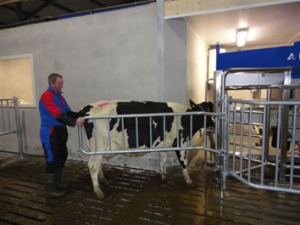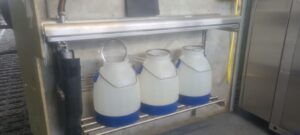No times to graze cows.
In summer it is not good to graze cows outside between approximately 1:00 PM and 5:00 PM.
Then it is simply too hot, especially for productive cows.
And that does not fit in with the natural rhythm of the cow.
She wants to eat her rumen full in the morning and chew her cud in the shade when it is warm.
And in the evening, fill up her rumen again and then chew the cud in a safe, sheltered place.
The stable is ideal for a shady and sheltered spot…
So take this fact into account with the milking times and selection gate settings.
Let her go outside early in the morning, having been milked, and in the evening, when the heat has passed, after her milking, give her permission to go outside again.
Make sure the feeding aisle is empty (at 4 a.m. – 6 a.m.) if you want them outside and only bring fresh food to the feeding fence around 11 a.m. when you want them back inside.
Afternoon/evening ditto).
Then the feed intake and the number of milkings per day are often not too bad.
And: Bearing capacity of the soil in the spring is more important than the amount of grass on it. Then they learn the daily rounds fastest.

